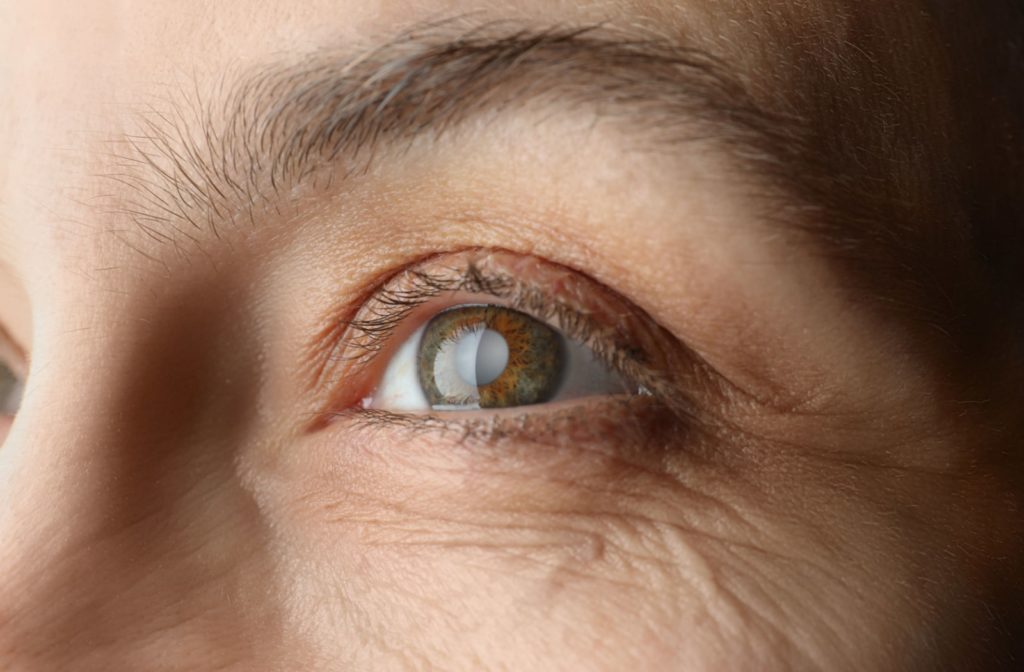Cataracts are a common concern of growing older, where the lens—the clear structure inside the eye responsible for focusing—becomes cloudy and impairs vision. In the early stages, your eye doctor may prescribe lenses to help sharpen your vision. However, as a cataract progresses, cataract surgery is the only way to remove it.
But can a cataract return after surgery? No, a cataract can’t return after surgery. Cataract surgery involves removing the cloudy lens and placing an artificial lens made from a synthetic material that won’t cloud up.
What Is a Cataract?
A cataract is a clouding of the lens in the eye, which can lead to vision loss and difficulty seeing clearly. Cataracts appear when proteins in the eye’s lens break down and cause clouding.
It’s a common condition that often occurs with age but can also be caused by other factors such as UV damage, trauma, medications, systemic conditions, and congenital conditions. Cataracts can develop slowly over several years or rapidly over several months.
Symptoms of cataracts can be mild in the early stages with minimal disruption to vision or affect your vision as the cataract progresses. Common symptoms of cataracts can include the following:
- Blurry or foggy vision
- Double vision
- Halos
- Dull colour vision
- Light and glare sensitivity
- Difficulty driving at night
- Difficulty seeing or reading at night
Cataract Surgery
When vision is minimally affected during the initial stages of a cataract, your eye doctor may recommend an updated glasses or contact lens prescription to provide sharper vision. However, if a cataract is left untreated as it progresses, and corrective lenses no longer improve vision, it can significantly impact daily activities and quality of life.
Cataract surgery is the most common procedure to remove cataracts. In cataract surgery, the cloudy lens is removed and replaced with an artificial intraocular lens (IOL). If you have cataracts in both eyes, cataract surgery is performed on one first to allow for healing before the second surgery.
The immediate recovery period is crucial. Patients generally wear an eye shield for a few days to protect the eye and use medicated eye drops. Cataract surgery is a safe, effective, and low-risk procedure.
You can experience noticeable vision improvement in a few days after cataract surgery. The eye may take several weeks to recover fully, but you can experience the following symptoms a few days after surgery:
- Itchiness
- Blurriness
- Light sensitivity
- Eye discomfort
- Dry eyes
- Irritation
- Watery eyes
- Red eyes
Can Cataracts Return Post-Cataract Surgery?
Cataracts can’t return after cataract surgery. Protein breakdown in the natural eye lens is what causes a cataract to form. Because an artificial lens made of synthetic material replaces the natural lens in cataract surgery, there is no protein to break down and form a cataract.
In some cases, after cataract surgery, you can experience cloudy vision. This is not a cataract but a secondary cataract or posterior capsular opacification that can mimic the symptoms of a cataract, such as blurred vision. It can occur when the transparent membrane or outer capsular bag that holds the lens becomes cloudy.
Cataract Prevention Strategies & Screening
Would you like to lower your risk of developing cataracts? The key to preventing cataracts is to maintain a proactive eye care regimen. Various strategies can help keep your vision clear. These include:
Protective Eyewear & UV Exposure
Shielding your eyes from the sun’s harmful rays can help reduce your risk of cataracts. Eye protection includes wearing a hat and sunglasses, particularly those that offer UV protection. Protective eyewear is also essential when engaging in activities that risk eye injury.
Healthy Lifestyle Habits
What’s good for your overall health can also be good for your eyes. Eating a nutritious diet, exercising regularly, and not smoking can benefit your vision. Diabetes is another risk factor for cataracts, so managing high blood sugar with the help of your healthcare provider is essential.
Regular Eye Exams
Based on your age and eye health, your eye doctor will advise you on how often you should return for follow-up eye exams. These appointments are crucial, as they can help detect changes in your vision early. If your eye doctor notices a negative change, they can catch the issue before it progresses and impairs your vision.
Restoring Your Vision
Cataract surgery is a life-changing procedure, with many patients enjoying a significant improvement in their vision afterward. What’s more, cataracts can’t return after surgery.
When you stay proactive with your eye health and maintain regular eye exams with your eye doctor, you can reduce your risk of developing cataracts. If you have concerns about your vision or cataracts, book an appointment with Doctors EyeCare Grande Prairie to learn how to manage early-stage cataracts and if cataract surgery can help restore your vision.




